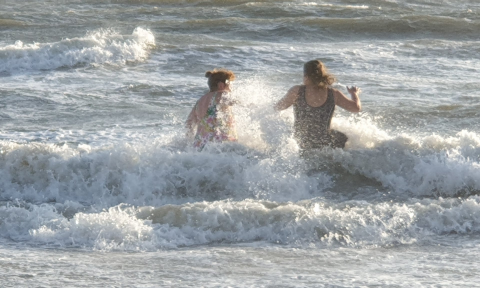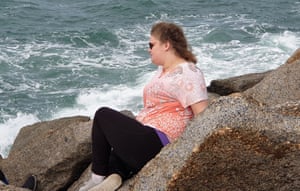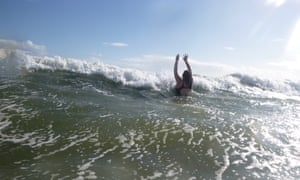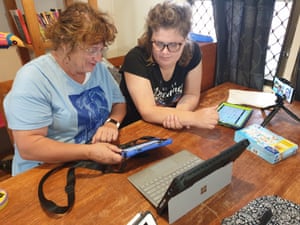
A sense of routine is essential for Morgan Tilly, who has non-verbal autism. So when coronavirus restrictions hit, her family had to create familiarity amid the uncertainty.
Morgan Tilly, 24, loves to swim. She seems to have a physical, sensory need to be in the water.
So every day during lockdown her mother, Catch Tilly, would scour websites to see when South Australia was reopening its swimming pools. And every day they remained closed, she and Morgan would go to the nearest beach, usually Semaphore in Adelaide, even for 10 minutes. No matter the weather, they would change their clothes in the disabled toilets and enter the water.
“We spend more time driving to and from the beach than we do in the water,” Tilly says. “But it’s just essential for her.” Public pools were allowed to reopen with 10 swimmers at first, now increased to 20, but Tilly says most have told her they’ll remain shut until June and she can’t wait – the sea is getting cold.
Morgan has non-verbal autism. She speaks using an iPad, tapping the word “hello” over Zoom, and wandering in and out of view while her mother explains life during a pandemic with Morgan.

The idea was initially frightening to Tilly, an author of young adult books, and her husband Mark, who closed his business as a sword fighting instructor for many weeks. Not that they didn’t love having more time with Morgan, who most of the time is “an absolute joy to be around”.
It was about routine. Morgan needs routine and can get upset, disoriented and occasionally violent without it. Tilly worried that if any member of the family became ill, the isolation at home would have created serious problems for Morgan, who is the youngest of four daughters.
“It’s been a real rollercoaster,” Tilly, 56, says. “There’s been so much that’s been really good, this opportunity for me and Mark and Morgan to just stop. She’s spending so much more time with us … [But] it’s also been massively stressful because of course, she’s autistic. She hates change.”
Tilly is expansive, even amusing, about the peculiarities of life with Morgan under Covid-19 restrictions. Her daughter is social and likes going out, but Tilly avoids taking Morgan shopping unless she takes a firm grip of her hand. “She has this habit of going up and sniffing people’s hair,” she says. “She loves particularly girls around her own age with lovely long hair. She thinks they’re very pretty and she wants to be friends … Now, this is a bit freaky under normal circumstances [and] normally people are so positive, but I felt during Covid this could be in very poor taste.”

Before South Australia enforced coronavirus restrictions in late March, Morgan’s life had a pattern. During the week, she was attending two facilities for people with disabilities.
There were set things that had to be undertaken beforehand. She got up, and her iPad was turned on. Tilly would have to get up, too, or Morgan would pull the blankets off her. She had a shower or bath – often both. She often had to hang clothes up on the line or bring them in and fold them. For a while, she had to do colouring with a specific set of pencils.
Every day had a schedule. Tuesday afternoon she’d spend with Mark and then go with him to watch his medieval sword fighting lessons at a local church hall. Wednesday was horse-riding. “There was this complete routine, where every single day you did a different thing.”
Tilly pulled Morgan out of one of her care centres because she was concerned about its hygiene standards, but Morgan still attends two days a week at Windamere Park, a specialist centre for adults with intellectual disabilities and neurodevelopmental disorders.
On other days, she’s at home with Tilly and Mark. Morgan is a large woman – 183cm or 6ft in the old measure – and very occasionally if she gets upset, she becomes violent, scratching and biting.
The family went to the zoo on the last day it was open before lockdown.
Tilly explained to Morgan that she wouldn’t be attending one of her day facilities anymore, and “she thought about it for a minute and then she just went me … There were two gates and I got out one and tried to hide around the corner. She actually attacked the gate so severely that she broke [it].”
The first weeks under restrictions were “completely chaotic” because routines were upended but after that, Morgan settled. Some of her usual activities had to be cancelled but her speech therapist trialled lessons via Zoom.

Morgan cannot speak, but she can communicate words and concepts through a special iPad. Tilly says Morgan has the mental capacity of a four- or five-year-old, although she is quick with technology and has adapted to online lessons.
Since those early weeks the family has coped, even flourished, and Tilly has seen Morgan benefit. “She’s just enjoying the extra [time together],” she says. “She’s coming in and sitting with us a lot more, like when we watch a movie in the evening.”
The biggest challenge has been the uncertainty about what would happen next. “Our approach with Morgan is to let her be free, so to speak. But that takes an enormous amount of planning, making sure an alarm is set in time for her to be able to do her routine before she leaves, talking to her on her iPad and writing up programs, so she knows what’s happening tomorrow and the next day.”
Any family with a seriously disabled child is familiar with challenges, Tilly says. “We’ve spent the last 24 years dealing with the challenges. [Coronavirus] has intensified some of them and opened up new areas, but we’ve got that experience of having to create normal out of chaos.”
South Australia has been extraordinarily successful in containing the virus, with no new positive cases recorded since 7 May. More restrictions are due to be lifted on 1 June.
“If Morgan can deal with the new normal then we can all deal with the new normal.”
from https://www.theguardian.com/news/2020/may/26/its-been-a-real-rollercoas…